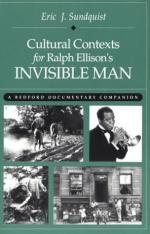|
This section contains 5,252 words (approx. 18 pages at 300 words per page) |

|
SOURCE: "Ralph Ellison's 'Flying Home': From Folk Tale to Short Story," in Journal of the Folklore Institute, Vol. XIII, No. 2, 1976, pp. 185-99.
Below, Ostendorf illustrates Ellison 's understanding of the aesthetic, social, and historical functions of black folklore through a detailed analysis of "Flying Home. "
"All music gotta be folk music; I ain't never heard no horse sing a song." Louis Armstrong's reply to a critic, who expected him to draw a line between popular folk music and high jazz, could have been Ellison's. His notorious irritation with critics who explained away the "low" comedy of folk forms in order to get at the deeper anthropological, political, or poetic significance of his work, springs from a similarly preliterate and inclusive understanding of the words "folk" or "folklore." Ellison's exchange of open letters with Irving Howe and Stanley Edgar Hyman marks his disagreement with two extreme but typical misreadings...
|
This section contains 5,252 words (approx. 18 pages at 300 words per page) |

|


